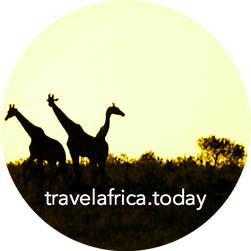|
Now that was a great night's sleep. Aircon. King-sized bed. Blissful. We awake to a new day and a new journey from Kasane and begin our southward bound travels back towards South Africa. We bid farewell to this oasis and the unmistakable smell of African luxury - polish and thatch. It's an easy drive on great roads as we head from Kasane towards Elephant Sands, just outside Nata, about 300km away. We hit one road stop and are worried we might lose our meat, but thankfully they don't search the car and we just have to do the requisite “stand on the mat” thing….to kill bugs…we seem to have done this enough times. We spot the turnoff to Elephant Sands wondering what it will be like. The road is sandy so we quickly engage four wheel drive so as not to have a repeat of yesterday. As we approach the lodge we see that the name is given for a good reason. A herd of elephant are drinking from the waterhole right in the center of the lodge. It's amazing. This is really up-close-and-personal…but it’s about to get even closer! We are standing about 5m from the herd as they drink. All that separates us is open space and a slightly raised pool deck area. The African sun is doing its thing and soon we are cooling in the pool, sipping a beer and watching the herd drink right in front of us. Our chalet has a great view of the waterhole so we decide to sit there and enjoy our sundowners as the sun dips towards the horizon. We put our chairs in the shade on the side of our chalet and I decide I'll use this time to do some podcast recording. Soon I have my laptop setup up in this blissful environment and am busy recording a scene when suddenly a sixth sense causes me to turn around. A massive elephant is making its way silently to the waterhole from behind us and is only a couple of meters behind us. With a yelp Nicky and I leap up and make a mad dash for the safety of our verandah while the large dusty grey elephant saunters by. Eish…Africa is crazy. Soon I'm settled down again and all is good. I'm midway through another scene when I hear someone clapping on the verandah. I look up with irritation to see who has messed up my recording to see that I'm being warned of several elephant heading my way from the waterhole in front of me. A hasty retreat to safety is necessary. It seems my idyllic position is not really ideal for video recording as I'm on the elephants' path. After rustling up a mince and nachos dinner we decide to stroll back to the pool area to watch the herd drinking at night. More and more elephants arrive. We see their huge dark forms silhouetted by the full moon as they emerge out of the bush. The waterhole is a hive of activity. Slurping, rumbling, stomping and the occasional trumpet of warning. Thick dust hangs in the air mingling with the wet earthy smell of the elephants. Seated just meters from them it feels like we are in the middle of the herd. Every now and then one of them walks towards us causing a hasty retreat as their massive forms loom too close for comfort. Their thirst seems insatiable as they spend hours slurping the water while more elephant arrive. It's a spectacular scene lit by the dull light of the full moon. However there is one big challenge. Getting back to our chalet. There is a constant stream of elephants appearing out of the darkness from all directions and leaving the waterhole again. Our chalet is in the path of on one of their main routes. We huddle together standing by the edge of the restaurant peering out into the silvery darkness looking for a safe path. Several large elephant are too close for us to walk and are looking at us. We retreat. “Ok, family,” I say after five minutes, “this is our chance.” There are several groans of objection from the kids citing their youth and non-preparedness for an early demise as reasons to wait longer. However, we push on. Most of the herd is now on our left near the waterhole. They are at least 5 meters away! Several others have walked off towards our right but are off our direct path. We scuttle quickly in the light of the moon toward a log, using it as some form of cover. A dark shape looks ahead. We freeze. It moves silently off. We dash and with several elephant coming up from our left we just make the safety of our chalet in time. The children will get to live another day - and more than that, celebrate the amazing invigoration of having lived that day in the incredible majesty and adventure of Africa.
Comments
We are on our way again and headed to the famed Etosha. Etosha means “the great white place” - and you can see why. Everything is covered in a fine layer of white dust. Even the animals. The zebras are more like albino zebras. The trees look like they’re covered in snow - except for one thing. It’s over 40c! It doesn't take long before we see what this vast open white barren landscape offers. Huge herds of animals clustered around the meager water supplies or huddled under the pitiful shade offered by the tiny trees. We pull up at a dam and hundreds or springbok, zebra, giraffe and wildebeest are standing languidly around the pan. Impressive. We never see such vast numbers of animals in South Africa. Within an hour our list includes springbok, zebra, giraffe, wildebeest, oryx (aka pie bucks), jackal…and then…lion! They are right on the side of the road and we pull up next to them. They fix us with their beady golden eyes and I recall the recent incident where lions ate a tourist. There's a thrill being just a meter away from this amazing animal. We snap millions of photos as we soak in the sight. A little later we come upon Etosha - literally. A herd of elephant who are white with the dust of Etosha. Spectacular. The sightings are amazing but we must get to our campsite. So we head towards Halali campsite. Here's hoping for green grass and shady trees. “Eish!” we exclaim as we arrive. White dust swirls in the wind while the oppressive heat strangles everything in a constricting tourniquet. We look at this and wonder how we will put up our tents in this harsh environment. Should we wait till its cooler? Finally we decide to bite the bullet…or dust, and just do it. We crack open a beer and within 45 mins we have setup camp and are headed to the pool. As the sun sets we head to a waterhole at the campsite. It's like a movie theater. Loads of quiet people are seated staring out at the waterhole. We find a secluded rock and are soon sipping wine and watching God's imax as the fiery African sun sinks in red and orange splendor into the dusty horizon. The small waterhole turns gold as birds twitter excitedly welcoming the cool. It's like the end of a battle. A battle between light and dark - heat and cold. The earth relaxes. It breathes a sigh of relief as the sounds of the evening fills the air like a celebration of the end of this war. Tranquility. Peace. Bliss. Our first night in Etosha was great and we awake feeling refreshed. The night chilled considerably ensuring that we had a great sleep. While the nights are cool the day quickly warms and we decide to go and check out the pan attached to our campsite. We are treated to black faced Impala, that only occur in this area. After soaking up the sights and ambiance of the waterhole we head out on a game drive in search of game. Alas it's not as successful as our experience yesterday. We bounce along the corrugated roads for about two hours but don't see much. “I think we should head back,” someone wise suggests and we all agree. We are hungry and the animals are on vacation. Back at the camp we satiate our never ending thirst and hunger pangs and leap repeatedly into the pool to cool down. It's a great way to spend an afternoon. Laptop + pool = Productive Work. The only issue is the internet here is like sucking triple thick milkshake though a hollowed out piece of dental floss…Painfully slow. We return to the waterhole at the campsite. This evening we are treated to a rare sighting - three black rhino. I haven't seen black rhino in ages and it's a treat to watch them, of course made even better with a crispy white wine.A cloak of clouds is spread over the sky which is acting like a duvet cover for the land and not allowing the heat to escape. “Hey look at that rhino,” I whisper in a muted voice to the kids, “is that something coming out its butt? Is it having a baby?” We all look carefully trying to see as the orange light of the spotlight casts an eerie, dusty color on everything. The one rhino does seem to be separate from the other two and acting strange but it's hard to see for sure. So we decide to wait…and wait…and wait. Eventually the rhino moves off into the bush and although we can hear it we can't see it. Wait…wait…silence. The only sound is the occasional crashing of rhinos moving in the darkness. A small rabbit tentatively drinks water from the hole. A black backed jackal scurries past. A female kudu, obviously startled by something bounds into the light only to go bouncing off again into the darkness. Wait…silence. Stars. That's great, at least the duvet cover has lifted. 11pm. Wait. Silence. Eventually at 11:30pm we call it quits. Was that a baby rhino? Did she have it? Maybe we will find out tomorrow? Africa's story is always being written. For now we will sleep and await her next chapter tomorrow. As the camp stirs in preparation for the day the sounds easily penetrate our tent rousing us from our night's sleep. “Let's go to the waterhole,” Nicky suggests. So we get dressed - which here in the wild is simple - switch pajamas for shorts worn yesterday, shirt is already on, and you're done. However there is no sign of the rhino. We're expecting great things today after the nearly-maybe rhino birth. Yesterday Nicky was gifted by the blue bird of happiness. Joshie had pointed out the blue birds all around us - starlings - and a few minutes later one deposited it's load on Nicky, shaking it's butt to make sure everything was out. With this direct gift from the blue bird of happiness surely some great thing must be coming, and we are in for a treat we will soon find out. We head out and are soon questioning the wisdom of our decision. The roads are trying on vehicle and driver as we bounce over ruts and corrugations. The sky takes on its dark hue as the rising heat mingles with the white dust.Etosha is all about the massive 120km pan that for most of the year is dry. We've skirted the pan but we are now on a road that takes us out into the pan. The road ends and we get out of the car. White. Endless white stretches out merging in a blurry line with the white-dark sky. It's eerie, amazing, stark, endless. If you walked out there you would soon be lost in a void of featureless white. Chatting to a ranger we find out that a baby rhino was spotted.Could that be the end of our story? The heat drives us back into the car and we decide to head back via one last waterhole. As we come upon the waterhole we are treated to an amazing sight, or as Nicky says, “This was the one thing I really wanted to see in Etosha.” It's two elephant bathing in the pan. We sit watching them wallow in the cooling water at stages almost completely submerged before they reappear again. These huge beasts know a good thing when they find it - and now that we've had Nicky's bluebird it's time for us to take the hint from them and retreat to the cool of our waterhole - the swimming pool at the campsite. As the sun begins to set we head to our spot - the waterhole. A fiery ball muted by earth's dusty mantle. The water turns to polished gold. A lone rhino. She rubs her leathery hide on a worn log. From white to black She emerges from the golden liquid. Zebra approach. Cautious. A snort. A heavy foot falls. Dust rises in warning. They drink. Silence. Suddenly galloping hooves. Dust. A lone rhino. Doves flutter in unison with their mirrored twin. Silence. The earth waits. Her breathe held. He emerges alone. Seemingly birthed by the violet darkness. A deep rumble of excitement. He races towards the water’s silent offer. His mother following rumbles her displeasure. More arrive. Large. Small. The glass is shattered by dipping trunks. Thirst is satiated. Africa's dusty mantle washed off once more. As silent, as swift, they are gone. A lone rhino. Finally even color departs. A silent vigil. The earth sighs. Alone. Rhino. The heat is intense, more intense than normal. The fiery sun burns down relentlessly from the vaulted blue sky above. Everything is still. Even the birds and the insects are sheltering under whatever shade they can find. In the distance a warthog followed by three young, all with their antenna-like tails in the air, dart towards some mud. I reach lazily for some new green leaves growing on the edge of a branch from the tree under which I am cooling, while I flap my ears in an attempt to cool myself. I hear the rumble of a shiny beast as it draws near. I flap my ears, unperturbed. The heat is intense. While lions are exciting to spot in a game reserve, or an illusive leopard, there is really nothing that truly gets the heart racing like an elephant. The elephant is the only animal that possesses the power and size so that your vehicle offers little protection from it. Many times I’ve read of tourists stupidly getting too close to an elephant and finding their vehicle rolled and crushed in a seemingly nonchalant effort by the elephant. And so it is that Addo Elephant National Park, and surrounding areas, are famous for many things, but one specifically are their elephants. “Just step back and I will tell you when you can come forward,” the guide at the Kwantu Elephant Sanctuary informs us. We've never been to an elephant encounter, but we have read about Kwantu and their work with the elephants, and the price is affordable for a family of five, so we are keen to experience it. Before us four huge animals loom as the guides sitting atop them steer them towards us. They look at us from below their long lashes as they probe inquisitively with their dexterous trunks. All that stands between us and these mountains of grey muscle is a small wooden pole fence. “Ok,” the guide says, “you can go forward and feed them.” He hands us a small bucket filled with corn. “This is like chocolate for them,” he says smiling at us, “they love it.” He then demonstrates how we should feed these majestic animals. I step forward, holding a small handful of elephant “chocolate” and raise my hand which is a signal for the elephant to raise his trunk and open his mouth. A huge muscular trunk towers above me and before me the huge maw of it’s mouth opens revealing a soft searching tongue. I can smell the rich, musty smell of this huge beast as it waits expectantly. All I have to do is stick my hand into it’s mouth…that’s what he said didn’t he? For a moment I’m not too sure about this. After all, who puts their hand into a huge beast's mouth, unless you are keen on casting off your mortal coil. Yet now it is too late, as the huge elephant leans closer towards me. I push my hand into its mouth as it gently closes its mouth around my hand, covering me with it’s warm slobber. What a scary, strange, amazing feeling. I step away, in awe of this incredible beast. In moments we are all feeding them. Their long, worm like, trunks probe the air and slurp up the treats from our hands before returning again in search of more. There is truly something amazing about being so close to such a magnificent beast. All of a sudden you get perspective. We seem so small, so puny, so weak compared to the incredible power of the elephant. Pride evaporates to be replaced by wonder and awe at such a powerful animal, that can also be so amazingly gentle. We’re staying at the Avoca River cabins and the running joke during our trip has been whether we are staying in “the east” or “the west”, referring to the old east-west divide in Berlin, where spartan conditions existed on one side and luxury on the other. We have experienced both east and west, and it’s the blend that truly makes this adventure a wonderful experience. We are expecting “the east” as we know from the booking that our hut does not even have it’s own kitchen. “Will it have it’s own toilet? Will it have electricity?” the kids ask, hoping for more “west” and a chance to charge all the electronic devices that are more important to keep energised than our bodies. Much to the the children’s relief this is firmly “the west”. Our small hut which consists of just one room and a small shower/toilet (wow that’s great, it’s inside) is beautifully decorated and has beds for all five of us. The hut opens up on to a lovely deck that overlooks the river below. Sure, there is a communal kitchen, which is open on one side to a lovely braai area and another deck overlooking the Sundays river below, but this is only shared with one other hut. “Hi I’m Anna and this is Rosanne,” the elderly English lady says. “Sorry about the fridge,” she says referring to the shared fridge, “we will move our things so there is more room for you.” Soon we are chatting to these friendly ladies from the UK and sharing our stories with them, as we hear about their travels around South Africa. Once more this is what travelling is about - it is not about strangers you meet, but about friends you have not yet met. The main reason we are staying here is to visit Addo Elephant National Park which is nearby. Addo was established in 1931 and had only 11 elephants. Today this successful park, which is now the third largest park in South Africa, has over 600 elephants as well as lion, black rhino and many other animals.
“Imagine driving the whole of Addo and not seeing a single elephant,” Hannah commented the day before as we watched a huge herd of elephant lazily drinking and playing at a muddy waterhole. It sure seemed hard to imagine, but not at the moment. We have been driving for nearly two hours and have not seen a single elephant! How can those massive giants of the bush disappear so completely? In fact we have not seen a single animal besides a few scuttling warthogs. It’s as though the animals did not get the memo today that this is a tourist park and they are meant to appear, or at least take turns to appear. Are they on strike for better wages? Or maybe they are just tired of tourists? The answer is far more simple…it’s the heat. I have never in my life experienced a day like this. The plan was simple and very appealing. Unlike yesterday when we were at Addo earlier in the morning, today we would relax at our accommodation…swim, canoe, chill. Then at about 2pm we would head to Addo, cruise around spotting the wildlife before heading to the lovely braai spots they have at their fenced off picnic area. Yet we had not taken into account the weather. The sun was delivering a day like none other. Early in the morning it rose with lava-hot intensity and it simply burned hotter and hotter as the day went on. “Stop, it’s 41C,” someone shouted pointing at the temperature gauge in the car as we searched in vain for the animals. Out come the cameras to record this epic temperature. Ensconced in the bubble of aircon inside the car, the heat seems unreal. “Let’s open the window to feel it,” Sarah suggests. In seconds a dragon breathing fiery breath arises next to our car, engulfing us in unbearable heat, as the outside air rushes into the car. “Shut the windows! Shut them!” I scream, “we’re wasting the aircon.” With singed eyebrows and blow-waved hair from the brief encounter with the outdoors, we realise why there is not a single animal in sight. The temperature is unbearable. Just like the animals, there is no chance of us being outdoors and having a braai in this heat. “We could just put the meat on the car bonnet,” Joshua suggests, which is not a bad idea, but only if you want charred steak! “Stop, it’s 42….it’s 43….it’s 44….” Again and again we stop, pull out the cameras and capture the never-seen-before temperatures. It seems like we have been transported to a post apocalyptic world where all that exists is a fiery sun burning everything up. How long can this continue. Yet the sun, now heading to late afternoon, is not yet finished. Up and up the temperature soars, 45…46…47…It just seems impossible that it could get any hotter. 48…49. By this stage we are crazed with excitement…the animals forgotten, especially as they have all vanished. We keep stopping, not for animals but to photograph the temperature. Will it hit 50? We watch as we drive on, but finally the temperature begins to recede to a more respectable low 40s. As the temperature reaches, by comparison, Icelandic conditions of 37C, we spot our first elephant. The huge animal is sheltering under a small tree. As we stop and watch her she reaches her trunk up and grabs some leaves while flapping her giant ears. She looks at us, unperturbed as she continues to strip the thorny tree of its leaves. Later we see a lone bull cooling himself at a small water hole. At least some of the animals got the memo! In the evening, as we help our English friends make a log fire to cook their dinner…thanks Eskom for helping to bring us together by taking our electricity away…we go online to do some research about heat records in South Africa. We learn that the highest ever recorded temperature in South Africa was 50C recorded in Kirkwood, next to Addo, in 1928. We were 1 degree off of that…in fact, in all likelihood it was 50C or more somewhere nearby. It’s no wonder the animals were on strike. I don’t even think that elephant “chocolates” would have coaxed the elephants out today. This is Africa…it has it all, from cool rivers to warm elephant tongues to steaming hot days! Simply loving it! |
Archives
May 2017
Categories
All
|

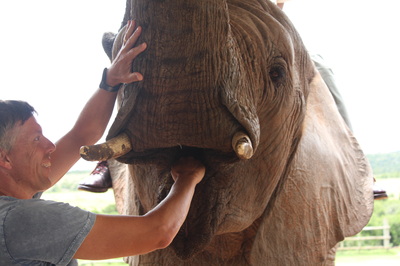
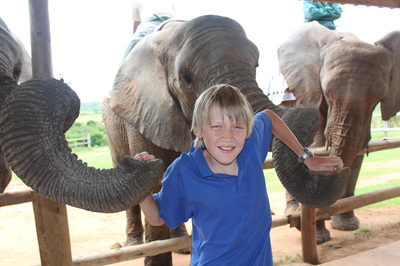
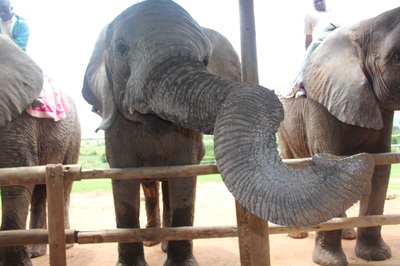
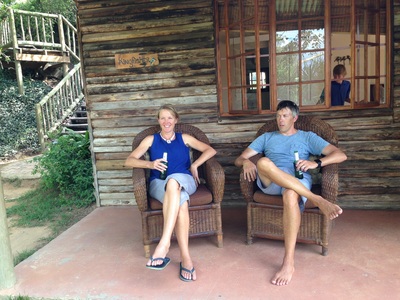
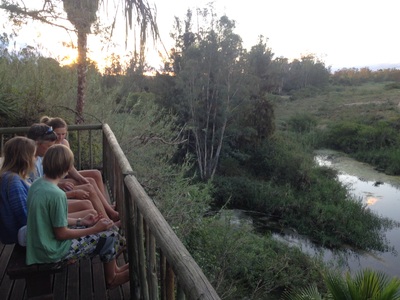
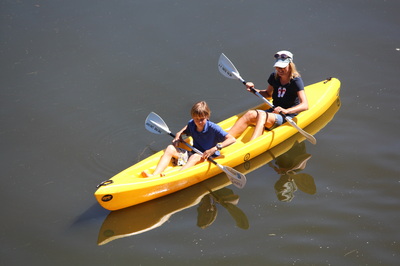
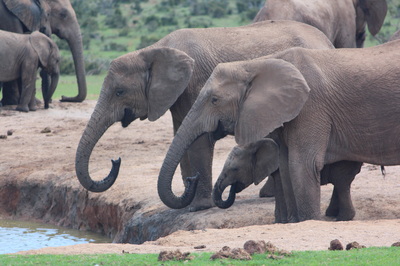
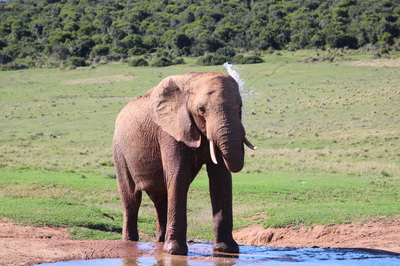
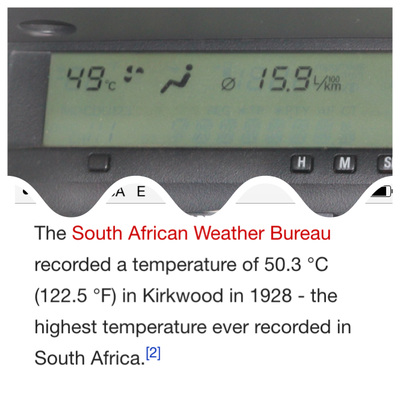
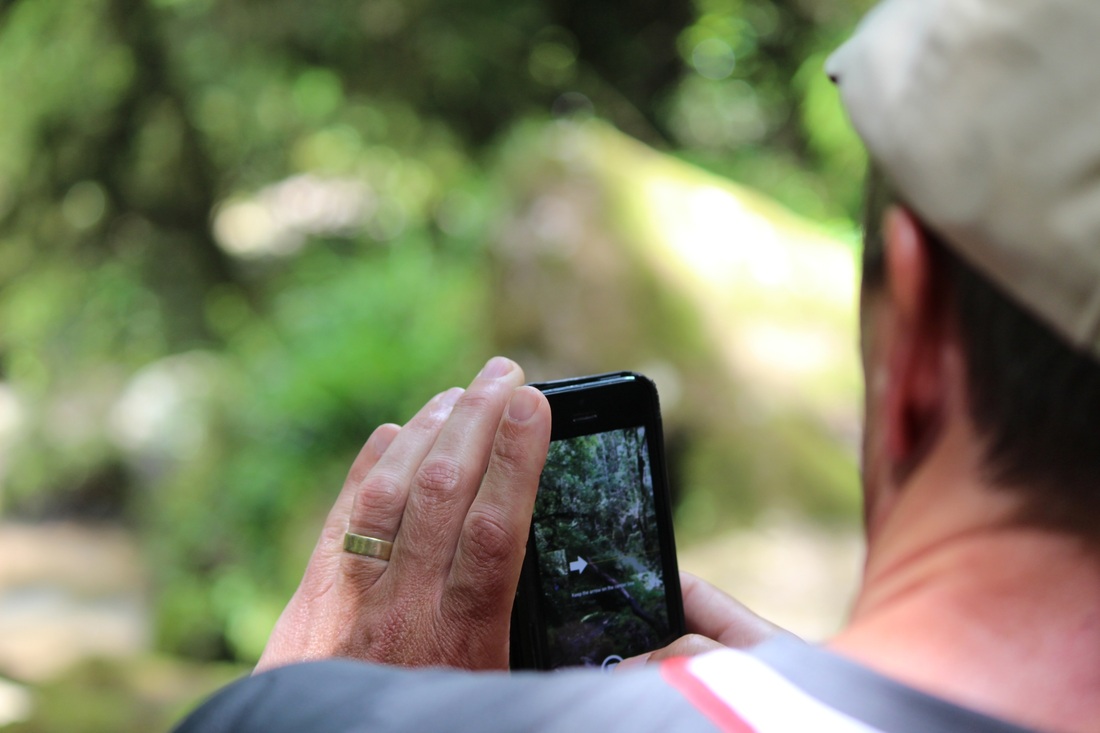
 RSS Feed
RSS Feed
